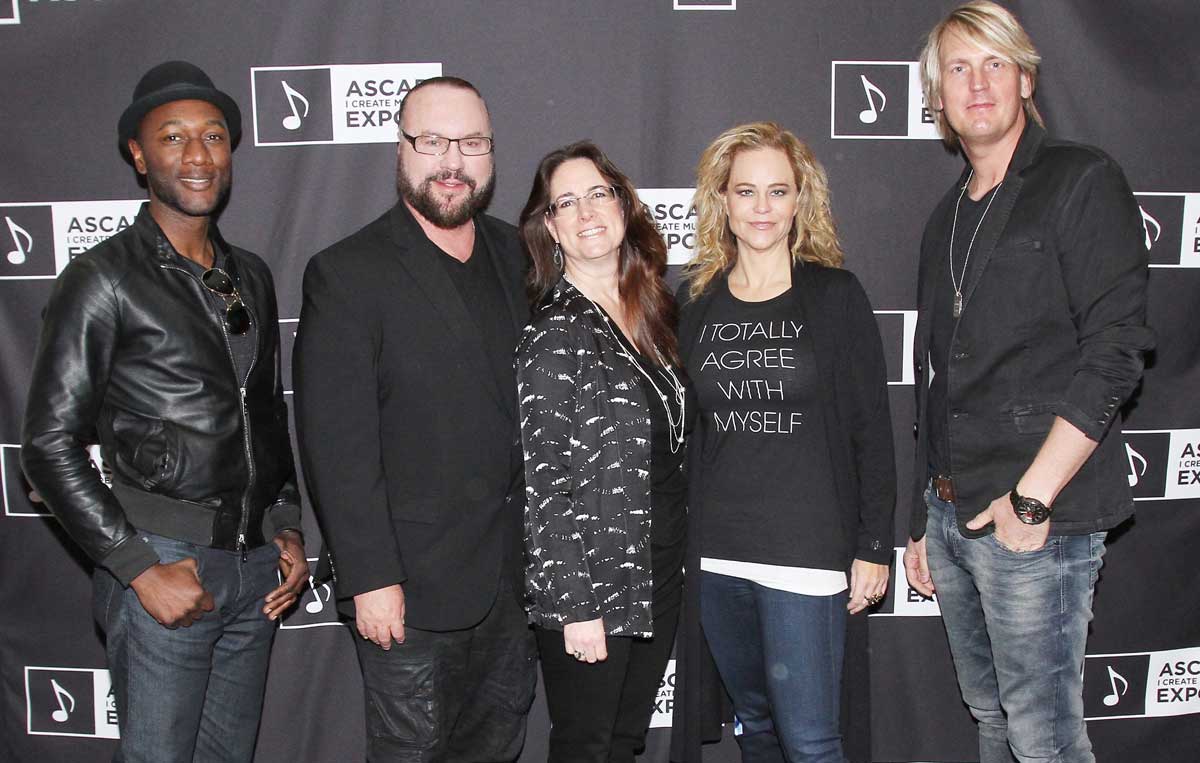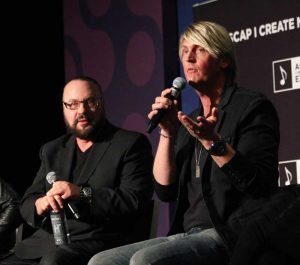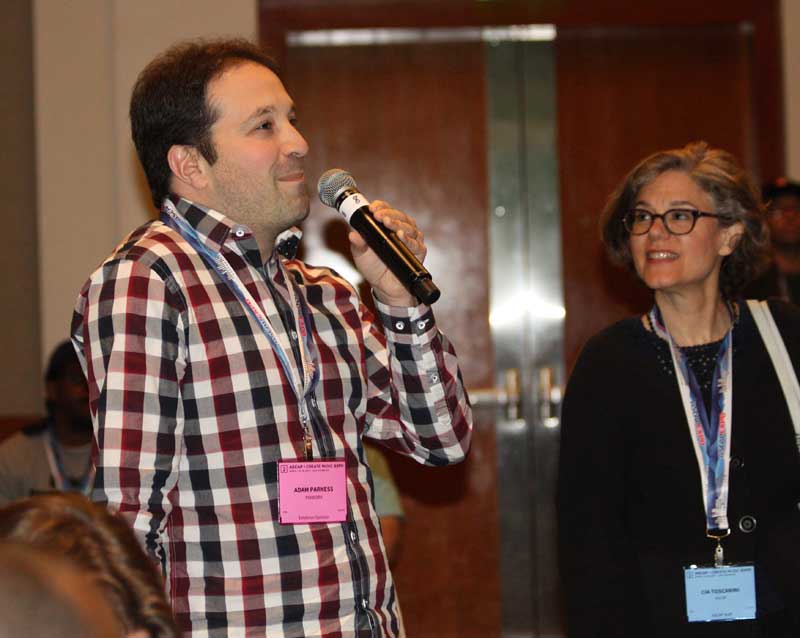
From left: singer-songwriter Aloe Blacc, songwriter and producer Desmond Child, composer Alex Shapiro, LaPolt Law’s Dina LaPolt, and songwriter-producer Niclas Molinder of Auddly (Photo by Maury Phillips/Getty Images)
Earning a fair wage was the running theme at the ASCAP “I Create Music” Expo, where the transition to streaming and digital left many songwriters feeling their legacies being blown away like so much dust in the wind. “Little by little, our names are being erased from existence,” said songwriter and producer Desmond Child, whose work has been recorded by everyone from Michael Bolton to Jon Bon Jovi. “You get rid of the name, why pay? The music just exists,” Child told the audience at the April 14 panel discussion “Getting Credit Where Credit is Due,” at the Loews Hollywood Hotel.
Child unveiled a white hat/black hat list of companies that provide credit — or not. Tidal, Amazon, Shazam, Apple Music, iTunes were characterized as in compliance with detailed credits for writers as well as performers (although some of the services required multiple clicks to get there). Vevo, Spotify and Pandora, on the other hand, seemed to fall short — although Pandora Head of Licensing Adam Parness, who was in the audience, got up and made an spirited defense of the music discovery service. “We have an integration that provides credits for songs with lyrics. We want our listeners — 81 million a month and growing — to learn about the people creating the music, and that’s not limited to songwriters, it’s composers, librettists, producers, engineers,” Parness said, apologizing that it’s not a full solution, since it doesn’t include credits for instrumental tunes, but it’s point from which the company hopes to expand.

Moderator Dina LaPolt says songwriters are over-regulated. (Photo: Paula Parisi/MaxTheTrax)
Session moderator, music attorney Dina LaPolt, noted that non-interactive digital services like Sirius and Pandora also pay a lesser compulsory license rate than interactive services that allow on-demand listening (although late last year Pandora entered into direct in negotiations with music libraries so it could offer the interactive Pandora Premium, which launched in March, albeit to a much smaller footprint than the flagship service).
Of course credit is only part of the battle to get recognition and payment. Attaching one’s credit to a song was detailed as an art in itself. Though for years, the process involved documenting contributions on a credit sheet that publishers would manage, the state-of-the-art in the electronic era is attaching the information digitally and having it live inside the composition as metadata. Panelist Niclas Molinder detailed that aspect by walking attendees through the song project platform Auddly, which garnered much interest. Auddly, which Molinder co-founded, lets song makers — be they writers, performers or producers — quickly lay down the rights marks as part of the creative process.
LaPolt stressed that while rights documentation is extremely important, equally so is the need for artists to push for regulatory changes to update US copyright laws, which have not kept up with technology. The US, which accounts for about 33% of the global music business worldwide, “doesn’t recognize the moral rights of authors, like they do in Europe,” said LaPolt, whose LaPolt Law Plc. last year sued the Department of Justice on behalf Songwriters of North America (SONA) over antiquated consent decrees that she says unfairly oppress creatives.

Desmond Child and Niclas Molinder (Photo: Paula Parisi/MaxTheTrax)
“Copyright is a private property. It should not be regulated by the government. It should not. It’s your property. You should be able to negotiate your right in a free market without the government saying what you should be paid. When there is a compulsory right, it means you do not have the right to negotiate. You are compulsed to say ‘yes.’ So every time someone wants to use your music, in a TV show or on broadcast, you do not have the right to negotiate. It’s a compulsory license governed by the consent decrees. These are horrible laws. In the US there are more regulations on songwriters than on pharmaceutical companies. That is f%$#ing sad!”
But there is light at the end of the tunnel. Creative activists have for the past three or four years been fighting for copyright reform. Crucial artillery in that battle is the proposed Copyright Selection and Accountability Act, designed to create an independent agency for the [US] Copyright Office. “Right now the registrar of copyrights reports to the librarian of congress, and it’s really not good. The copyright registrar should have at the seat at the table as a presidential appointee, confirmed by the senate, so they can understand and educate the president on copyright issues directly, just like the head of the PTO, the Patent and Trademarks Office. [Patents and trademarks] being two of the intellectual property rights, copyright being the third.”
The bill appears to have some momentum in the House of Representatives, where it passed muster with the judiciary committee. “We have to get this bill passed, because right now the librarian has a fundamental disconnect in protecting copyright,” LaPolt noted. Likewise, representative Doug Collins (R-GA), who spoke at a session earlier in the day, in 2015 introduced the Songwriters Equity Act to ensure market rates are factored into rate negotiations.
One audience member shared that “Human right no. 27 is the copyright. Do any of you know of any movements to get that right known more broadly so we don’t have to fight so hard?” Molinder, who lives in Sweden, pointed out that last year he and fellow songwriters and Auddley partners Max Martin and Björn Ulvaeus launched the Music Rights Awareness Foundation “exactly for that reason — to publicize that copyright is a human right and everyone who writes music should be paid for it.”

Pandora’s Adam Parness says his company deserves credit for educating customers about the people creating music.
(Photo: Paula Parisi/MaxTheTrax)


Comments are closed.